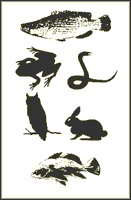Nebraska Cooperative Fish and Wildlife Research Unit

Nebraska Cooperative Fish and Wildlife Research Unit: Staff Publications
Date of this Version
2011
Citation
The Condor 113(4):825–833; DOI: 10.1525/cond.2011.110027
Abstract
Variation in the risk of predation to offspring can influence the expression of reproductive strategies both within and among species. Appropriate expression of reproductive strategies in environments that differ in predation risk can have clear advantages for fitness. Although adult-predation risk appears to influence glucocorticosteroid levels, leading to changes in behavioral and life-history strategies, the influence of offspring-predation risk on adult glucocorticosteroid levels remains unclear. We compared total baseline corticosterone concentrations in Gray-headed Juncos (Junco hyemalis dorsalis) nesting on plots with and without experimentally reduced risk of nest predation. Despite differences in risk between treatments, we failed to find differences in total baseline corticosterone concentrations. When we examined corticosterone concentrations across a suite of sympatric species, however, higher risk of nest predation correlated with higher total baseline corticosterone levels. As found previously, total baseline corticosterone was negatively correlated with body condition and positively correlated with date of sampling. However, we also found that corticosterone levels increased seasonally, independent of stage of breeding. Nest predation can alter the expression of birds’ reproductive strategies, but our findings suggest that total baseline corticosterone is not the physiological mechanism regulating these responses.

